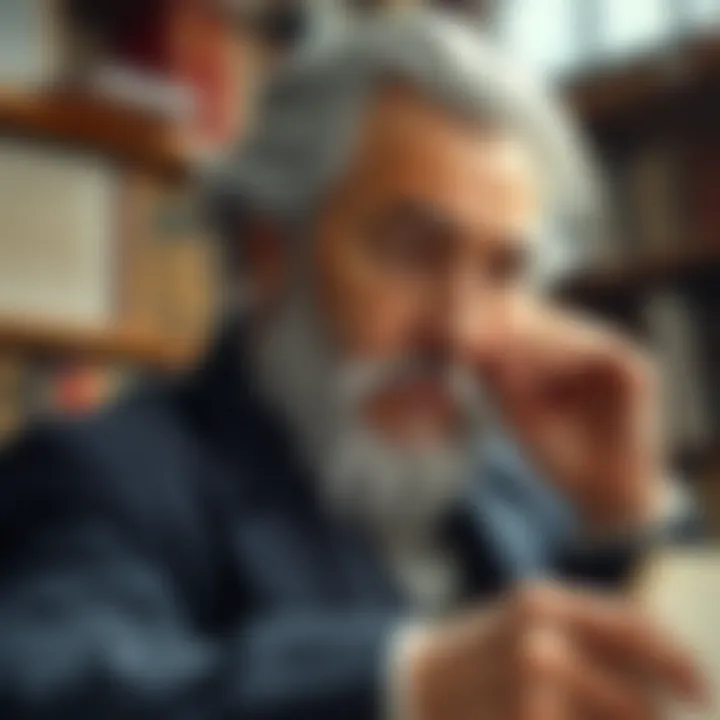Exploring the Impact of Philosophy on Modern Thought


Intro
Philosophy, a discipline as old as human thought, has shaped our understanding of reality, morality, and human existence. Great philosophers have wrestled with profound questions that continue to resonate today. Their wisdom can enlighten our lives in the modern world. This exploration serves not only as a tribute to these thinkers but also as a guide for those seeking to engage deeply with their ideas and principles.
Understanding the evolution of philosophy involves delving into the lives, contexts, and writings of influential figures. Splitting their thoughts into manageable segments allows us to appreciate the nuances of their perspectives. To aid in this journey, we approach the works of these philosophers categorically, ensuring a thorough examination of their contributions, relevance, and application in our lives.
From the ethical teachings of figures like Socrates and Kant to the socio-political ideologies of Plato and Marx, the legacies of these thinkers linger in our daily decisions and interactions. Additionally, as we explore these works, we bridge the gap between ancient philosophies and contemporary reasoning, uncovering insights that can foster personal growth and understanding.
Intro to Philosophy and Its Evolution
Philosophy has always been like a mirror reflecting human thought, questioning existence and values. In today's fast-paced world, grasping the foundations of philosophy serves not only as an intellectual exercise but also as a crucial tool for personal development. Understanding the evolution of philosophical thought can reveal how our society arrived at its current beliefs and priorities. With each philosopher building upon the last, their works knit together a rich tapestry full of insights that continue to challenge and inspire.
Defining Philosophy
Philosophy can be tricky to pin down since it encompasses so many aspects. At its core, one could say that philosophy is the study of fundamental questions regarding existence, knowledge, values, reason, and language. It propels us to ask, "What does it mean to be human?" or "Is there an objective truth?" This field encourages deep reflection and challenges us to think critically about our beliefs and assumptions. In a world where information is instantaneous and often shallow, philosophy invites us to look beyond the surface and question the very basis of our understanding.
"Philosophy is a battle against the bewitchment of our intelligence by means of language."
— Ludwig Wittgenstein
By grappling with complex ideas, philosophy sharpens critical thinking and fosters open dialogue. It bridges seemingly disparate fields—science, art, politics—providing a framework that integrates diverse perspectives. As we explore the works of great philosophers, we realize that their insights resonate with timeless truths, offering guidance in navigating modern life.
Historical Context of Philosophical Thought
To understand philosophy fully, we must place it within its historical context. Philosophy didn’t pop up overnight. It emerged from the minds of thinkers who lived in particular times and societies, each facing unique sets of challenges and triumphs. From ancient Greece's city-states to the vast realms of medieval scholarship, philosophy evolved, flexing to accommodate changing cultural landscapes.
In ancient civilizations, the search for knowledge often intertwined with mythology and religion. Thinkers like Socrates began to push beyond dogma, encouraging questions and dialogues instead of blind acceptance. This shift laid the groundwork for subsequent philosophers, who further unraveled the complexities of human thought and behavior.
The medieval period saw the synthesis of faith and reason, as seen in St. Augustine's emphasis on Christian doctrine while incorporating Platonic thought. Likewise, the Islamic Golden Age sparked a renewed interest in reason, logic, and ethics, as scholars like Averroes argued for a united approach to knowledge.
As time marched on into the Renaissance, the cultural revitalization led to a more human-centered philosophy. Figures such as Machiavelli and Erasmus explored power dynamics and human nature, sowing the seeds for modern political thought.
The Enlightenment, characterized by its emphasis on reason, continued this trajectory. Thinkers like Descartes and Kant shaped the foundations of modern Western philosophy, questioning not only authority but also the very nature of knowledge itself. Understanding this journey from the ancient to the modern reveals the intertwined nature of philosophy and human advancement, showcasing how past thinkers have laid the groundwork for contemporary discourse.
The Ancient Philosophers
The ancient philosophers laid the groundwork for much of Western thought, influencing generations to come. Their inquiries into existence, ethics, and knowledge continue to resonate in today’s discussions about morality, politics, and the nature of reality. Understanding their contributions is fundamental for grasping not only the evolution of philosophical ideas but also how these ideas permeate modern culture, education, and science.
Philosophy has its roots in the questions these thinkers posed, inspiring us to reflect on our beliefs, values, and the structure of society. They ventured beyond mere speculation; they sought clarity and understanding in a world ripe with uncertainty. Moreover, these ancient philosophers demonstrate the power of dialogue, as many of their discussions were influenced through debate and interaction.
Socrates: The Father of Western Philosophy
Socrates stands as a towering figure in the landscape of philosophy, often credited as the father of Western thought. Not interested in writing down his ideas, he instead engaged in conversations through the Socratic method, a technique that focuses on asking questions to stimulate critical thinking and illuminate ideas. This approach encourages self-examination and ethical reasoning.
His most notable contributions include:
- The insistence on defining ethical concepts and understanding the virtues governing human behavior.
- The assertion that "the unexamined life is not worth living," emphasizing the importance of introspection and personal accountability.
- The creation of dialectical methods that elevated philosophical discourse.
"To know thyself is the beginning of wisdom."
This phrase encapsulates Socrates' ethos, suggesting that true knowledge arises from understanding one’s own mind and actions. His approach still serves as a guide for philosophical inquiry.
Plato and the Theory of Forms
Plato, a student of Socrates, expanded upon his mentor’s ideas. He founded the Academy in Athens, which is often considered the first institution of higher learning in the Western world. Central to his philosophy is the Theory of Forms, which posits that beyond our tangible experience lies a realm of abstract ideals or Forms. These Forms represent the true essence of concepts such as beauty, justice, and equality.
Key aspects of Plato's theories include:
- The existence of two realms: the physical world, which is imperfect and subject to change, and the world of Forms, which is eternal and unchanging.
- The belief that understanding these Forms allows one to access true knowledge, contrasting the mere opinions one might form based on sensory experiences.
- The allegory of the cave, illustrating how philosophical enlightenment involves moving from the shadows of ignorance into the light of knowledge.


Plato's works laid the foundation for subsequent philosophical dialogues, influencing metaphysics, epistemology, and ethics.
Aristotle's Contributions to Logic and Ethics
Aristotle, a student at Plato’s Academy, took a contrasting approach. He emphasized empirical observation and categorized knowledge into different realms such as physics, ethics, and metaphysics. Aristotle's pioneering work in logic, particularly through the development of syllogisms, grounded logical reasoning that is still taught today.
His contributions span multiple fields:
- Ethics: Aristotle's notion of virtue ethics emphasizes character and the importance of achieving eudaimonia, or human flourishing, through a balanced life of reason and moral virtue.
- Logic: He established the foundation for formal logic, shaping how arguments are structured and evaluated.
- Natural sciences: His systematic classification of plants and animals laid the groundwork for the biological sciences.
Aristotle's pragmatic approaches not only fostered various academic disciplines but also provided a robust framework for ethical thought that is relevant in contemporary discussions about morality.
In summation, the explorations of these ancient philosophers invite deep reflection on the nature of knowledge, ethics, and the human experience. Their legacies continue to inspire rigorous examination, serving as catalysts for philosophical inquiry today.
Medieval Philosophy
Medieval philosophy serves as a crucial bridge connecting ancient Greek thought with the emerging ideas of the Renaissance and beyond. The period from the 5th to the 15th century saw a remarkable interplay between faith, reason, and the struggle to understand existence. This era brought forth influential thinkers who attempted to reconcile religious beliefs with philosophical inquiry. The significance of medieval philosophy lies in its foundational role in shaping European intellectual landscapes, laying groundwork that would be built upon by later philosophers.
The core themes in medieval thought included metaphysics, ethics, and the relationship between religious doctrine and human understanding. Scholars of this age sought to answer profound questions about the nature of God, free will, and the essence of reality. These discussions echo in contemporary debates, underscoring the timeless relevance of medieval philosophy. As a result, exploring this rich period not only illuminates the past but also informs current philosophical paradigms and discussions.
St. Augustine: Synthesis of Faith and Reason
St. Augustine stands as a titan within medieval philosophy, often regarded as its most influential thinker. His work exemplified a synthesis of Christian theology and Platonic philosophy, a combination that reshaped the contours of Western thought. In his texts, particularly "Confessions" and "City of God," Augustine navigated the complexities of human nature, sin, and divine grace.
Augustine's concept of the City of God, delineates between the earthly and the divine. His belief that human reason is essential yet insufficient for grasping the divine truth reflects his nuanced understanding of faith and intellect. Augustine posited that while reason can guide one towards truth, there remains an element of divine illumination required to fully comprehend it.
His impact resonates through ages, influencing countless scholars and theologians. Augustine's thoughts on morality, free will, and the existence of God continue to provoke discussion and debate, demonstrating that his philosophy transcends time and context.
Averroes and the Islamic Golden Age
While St. Augustine laid important groundwork in the West, Averroes, also known as Ibn Rushd, brought significant contributions from the Islamic Golden Age. A 12th-century polymath, Averroes played a key role in preserving and transmitting Aristotelian philosophy, serving as a bridge between Islamic and European thought.
Averroes emphasized reason as a fundamental tool in understanding the world. He argued that philosophy complements religion, rather than contradicts it. His Commentaries on Aristotle showcased his innovative interpretations, demonstrating the harmonization of Aristotelian logic with Islamic theology. In particular, his writings on the nature of the soul and the universe prompted reevaluation of philosophical thought in medieval Europe.
By advocating for the compatibility of faith and reason, Averroes left an indelible mark on scholastic thinkers in the West, including Thomas Aquinas. His influence not only enriched medieval philosophy but also paved the way for the Renaissance's humanist ideals.
"The aim of philosophy is to lead us to a better grasp of the truth."
Averroes' legacy endures, reminding us of the invaluable dialogue between cultures and traditions that has shaped philosophical thought throughout history.
Renaissance Philosophers and Humanism
Renaissance thinkers emerged during a time when Europe was reawakening from the stagnation of the Middle Ages. This period, often regarded as a bridge between the medieval and modern world, brought about an explosion of new ideas and a focus on human potential. The importance of Renaissance philosophers cannot be understated; they laid the groundwork for a new way of thinking that valued empirical evidence, personal experience, and the power of individual thought. This was a time when humanity began to break free from strictly religious constraints, opening the door to a more nuanced exploration of human existence, ethics, and politics.
Humanism, as a dominant intellectual movement, emphasized the study of classical texts from Greek and Roman antiquity. Such a perspective encouraged a renewed focus on human interests and values, paving the way for the development of arts and sciences in ways that had not been seen before. Throughout this section, we will examine the influence of two pivotal figures: Niccolò Machiavelli and Desiderius Erasmus. Both thinkers brought forth radical ideas that shaped political theory and ethics in profound ways, reflecting the changing landscape of their time.
Machiavelli and Political Realism
Niccolò Machiavelli is often hailed as the father of modern political science. His seminal work, The Prince, is a stark departure from the idealized depictions of rulers. For Machiavelli, successful governance is not about adhering strictly to morality; rather, it's about the outcomes of power and control. He famously posited that "the ends justify the means," a phrase that stirred much debate.
Machiavelli's emphasis on political realism is notable. He presented a candid view of human nature, suggesting people are often driven by self-interest and fear. This pragmatic approach provides a stark contrast to the lofty ideals of earlier philosophers. In essence, Machiavelli didn't shy away from the darker aspects of human behavior; he embraced them. By doing so, he laid the foundation for a new kind of leadership that could be ruthless, calculating, and, at times, manipulative.
"The wise man does at once what the fool does finally."
— Niccolò Machiavelli
His ideas have influenced countless political leaders and theorists throughout history, from the cunning strategies of realpolitik to the modern notion of statecraft. In every corner of political discourse, Machiavelli’s influence lingers, often providing the underpinnings of debates surrounding ethics and governance.
Erasmus and the Humanist Tradition
In contrast, Erasmus of Rotterdam championed a more optimistic view of humanity and a return to simplicity in life. His work, In Praise of Folly, employs satire to critique the social and political woes of the time, particularly the corrupt practices within the Church. Erasmus sought not only to reform the Church but to invigorate the moral values that underpinned society, emphasizing education and dialogue as tools for improvement.
Erasmus's brand of humanism focused on studia humanitatis, the study of humanities, underscoring the importance of literature, ethics, and philosophy. While he shared some common ground with Machiavelli in that both were concerned with human governance, Erasmus offered a more morally grounded approach. He believed in the innate goodness of humanity and the capacity for individuals to uplift society through reason and virtue.


His ideas contributed significantly to the intellectual currents that preceded the Reformation and established a renewed interest in learning that persisted for centuries. Erasmus’s emphasis on dialogue and debate shaped the landscape of educational practices, propagating a vision of society engaged in a thoughtful discourse about moral and ethical matters.
The Enlightenment and Rationalism
The Enlightenment, often seen as a turning point in the history of Western thought, set the stage for modernity with its emphasis on reason and individualism. This era strived to break free from the shackles of tradition and dogma, allowing humanity to explore knowledge through the lens of rational inquiry. Philosophers like Rene Descartes and Immanuel Kant emerged during this time, challenging existing notions and laying down frameworks that would guide future generations. Their thoughts marked a significant shift away from purely faith-based reasoning towards a more empirical, critical investigation of reality.
This movement is crucial to understand within the broader context of philosophy as it not only addresses the methodologies of thought but also encourages an active pursuit of understanding in various areas such as science, politics, and ethics. The Enlightenment has paved the way for the questioning of authority, tradition, and established norms. Many concepts we take for granted today, such as human rights and secular governance, stem from Enlightenment ideals.
Descartes: Cogito, Ergo Sum
Rene Descartes stands as a monumental figure in this intellectual revival. His famous declaration "Cogito, Ergo Sum"—I think, therefore I am—serves as a foundational element of modern philosophy. Descartes shifted the focus of philosophy inward, prioritizing the act of thinking as evidence of existence. This introspective approach invited individuals to consider their own thoughts and doubts as starting points for knowledge.
Descartes' method of systematic doubt urged scholars to question everything they thought they knew. Prior to this, philosophical discourse largely revolved around accepting established truths based on tradition or doctrine. His method advocated for a clean slate—challenging perceptions and seeking foundational truths through logical reasoning. A few key elements from Descartes' philosophy include:
- Methodical Doubt: The procedure of questioning everything that could be doubted, leading to undeniable certainties.
- Dualism: The distinction between mind and body, suggesting that the two substances are fundamentally different.
- Mathematics and Certainty: Descartes argued that the clarity and precision of mathematical reasoning could serve as a model for other fields of inquiry.
By laying this groundwork, Descartes not only influenced future generations of philosophers but also scientists who sought to understand the world through reasoned experimentation.
Kant and the Foundations of Modern Thought
Moving ahead in the chronology of philosophical development, Immanuel Kant furthered the Enlightenment's rationalist dialogue with his revolutionary ideas about knowledge, ethics, and metaphysics. Kant proposed that reason is the source of morality and that human beings must actively participate in their understanding of nature and society. His works, especially Critique of Pure Reason, delve into the parameters of human understanding, arguing that while our experiences shape our knowledge, there are innate structures in our minds that give shape to our experiences.
Kantian philosophy brought about pivotal concepts:
- Categorical Imperative: A cornerstone of his ethics, this principle asserts that one should only act according to that maxim whereby one can at the same time will that it should become a universal law.
- Autonomy and Moral Law: Kant emphasized the importance of individuals making moral choices based on reason rather than inclination or external influence.
- Transcendental Idealism: He reconciled empiricist and rationalist traditions by suggesting that while we can only know phenomena (the world as experienced), there are things-in-themselves that are fundamentally unknowable.
Kant's contributions paved the way for modern philosophy, as he merged rational thought with empirical observation, effectively synthesizing the Enlightenment's aspirations into a cohesive framework that still influences discussions of ethics and metaphysics today.
The legacy of the Enlightenment and its rationalists lies in their call for reasoned dialogue and skepticism towards dogma, which not only shaped academic thought but also inspired social movements towards liberty and justice.
In summation, the Enlightenment and Rationalism provide essential insights into human thought and society. They urge critical inquiry and foster a world where ideas can flourish, making a profound impact on our understanding of ethics, science, and the very essence of being.
Modern Philosophical Movements
Modern philosophical movements have shaped not just academic discourse but have infiltrated everyday conversations, social structures, and political ideologies. Their importance lies in how they reflect our time, helping us to understand our existence, the nature of society, and the ethical frameworks that guide human behavior. Existentialism and utilitarianism serve as prime examples, pushing boundaries and challenging established norms.
The unique perspectives offered by these movements invite individuals to critically assess their own lives and values. Particularly in an age marked by rapid change, the insights derived from these philosophies provide tools for navigating complex moral landscapes. The resonance of modern philosophical movements extends deep, pushing us to articulate what it truly means to live a fulfilling life in both personal and collective contexts.
Existentialism: The Thought of Sartre and Camus
Existentialism emerged in the 20th century as a significant philosophical movement, with key figures like Jean-Paul Sartre and Albert Camus leading the charge. At its core, existentialism grapples with the human condition, emphasizing that individuals are free and responsible agents who must create their own meaning in an inherently meaningless world.
Sartre's assertion that "existence precedes essence" highlights the notion that humans are first thrown into existence without any predefined purpose. From there, life becomes a canvas upon which individuals can draw their own values and beliefs. This idea can be both liberating and daunting, for it underscores the lack of an objective moral framework and compels individuals to make choices that align with their authentic selves.
Camus, on the other hand, tackled the absurdity of life. In works like "The Myth of Sisyphus," he posited that life is fundamentally irrational, yet through rebellion against the absurd, one can forge meaning. His concept of the "absurd hero"—someone who finds purpose in the struggle against futility—resonates with many seeking to navigate life's complexities.
"Man is the only creature who refuses to be what he is." - Camus
Utilitarianism: The Principles of Mill
Utilitarianism, championed by thinkers like Jeremy Bentham and John Stuart Mill, represents a consequentialist approach to ethics, focusing on the outcomes of actions rather than the intentions behind them. At the heart of this framework lies the "greatest happiness principle," which posits that actions are morally right if they promote happiness and alleviate suffering.
Mill expanded upon Bentham's ideas by emphasizing qualitative differences in pleasures. He argued that intellectual and moral pleasures are superior to mere physical pleasures, urging individuals to consider not only the quantity of happiness produced but also its quality. This perspective prompts a nuanced discussion on the implications of decisions that seem beneficial in the short term but may lead to harmful consequences for society in the long run.
The pragmatic approach of utilitarianism fuels discussions on public policy, economics, and ethics in various fields, from health care to environmental legislation. Its push for the greatest good for the greatest number compels ongoing debate about moral responsibilities in a rapidly evolving world.
Utilitarianism and existentialism serve as crucial lenses through which we can assess contemporary issues, fostering dialogues about freedom, responsibility, and the meaning of a good life. By engaging with their ideas, audiences can navigate their questions and dilemmas, recognizing that philosophy remains a vital part of human experience.


Critical Theory and Postmodernism
Critical Theory and Postmodernism play a pivotal role in understanding contemporary philosophical thought. They encourage us to question the very foundations of society, the nature of meaning, and the structures that shape our beliefs. This section dives into two significant movements that have challenged the established norms, inviting a deeper look into our reality and the discourses surrounding it.
The Frankfurt School and Social Critique
The Frankfurt School refers to a group of thinkers who emerged from a social research institute in Frankfurt, Germany, in the early 20th century. Central figures include Max Horkheimer, Theodor Adorno, and Herbert Marcuse. They aimed to unite Marxist principles with a broader emphasis on the cultural and psychological aspects of society.
Their work focused on social critique—analyzing the structures of power, culture, and ideology that influence people’s lives. One key idea was that traditional forms of critique were often limited. They aspired to go beyond the economic perspectives dominant in classical Marxism, arguing that culture was also influential in maintaining societal control. This viewpoint paved the way for discussions around media, art, and the role of mass culture in shaping individual consciousness.
For instance, Horkheimer and Adorno's book, Dialectic of Enlightenment, discusses how the Enlightenment ideals of reason and autonomy could lead to forms of domination and totalitarianism. This serves as a cautionary tale about the duality of progress versus regression.
Moreover, they emphasized the need for critical awareness. This concept stresses the importance of reflecting not just on the world, but on our place within it. By practicing this introspection, individuals can better recognize the hidden ideologies that permeate everyday life.
Derrida and Deconstruction
Jacques Derrida stands as a monumental figure in Postmodern thought, primarily through his introduction of deconstruction. This method challenges the idea that language is transparent and straightforward. Derrida argued that words carry multiple meanings and that the intended message often gets lost in translation. Language, he suggested, creates a system of differences where meaning is always in flux.
One of his fundamental assertions is "There is nothing outside of the text." This indicates that all meaning exists within a context of language, relationships, and structures. It implies that interpretations are never definitive but always subject to change based on new contexts or insights. With this approach, Derrida invited readers to consider the instability of meaning in texts, prompting a reconsideration of how we engage with philosophical and literary works.
Moreover, his idea of deconstruction extends beyond literature and into various realms of knowledge, including law, politics, and ethics. By deconstructing established truths and binaries (e.g., good vs. evil, male vs. female), Derrida created space for marginalized voices, thus amplifying the discourse surrounding identity and power structures.
In a nutshell, both the Frankfurt School and Derrida’s deconstruction lend critical tools for understanding our complex world. They challenge readers to not just accept established narratives but to question their validity, helping to navigate the intricate layers of meaning that define our existence.
“To lose the name of the father is to find the name of the other.”
Critical Theory and Postmodernism are essential not just as theoretical frameworks but as philosophies that insist on continuous inquiry and reflection. They highlight that philosophy itself is a living dialogue that evolves in response to the changing context of human experience.
Philosophy in the Contemporary World
Philosophy today is not merely a dusty relic from olden days. Instead, it serves as a robust framework guiding our understanding of an increasingly complex world. It helps individuals navigate through moral dilemmas, political strife, and the torrent of technological advances. In a time where information is abundant but meaning can seem elusive, the insights from philosophical discourse remain profoundly relevant.
The Role of Philosophy in Modern Thought
In modern thought, philosophy acts as a compass, helping us orient ourselves in the chaos of contemporary life. At the core, it encourages critical thinking and evaluation of ideas rather than mere acceptance. People can grasp the nuance and ambiguity of situations, which is vital in a world where black and white answers often fail to bring clarity.
- Critical Thinking: Philosophical engagement fosters the ability to critically analyze arguments. It teaches individuals to ask the right questions, pushing beyond the surface and uncovering underlying assumptions. This skill is invaluable, whether in academic, professional, or personal contexts.
- Ethical Frameworks: With the rise of artificial intelligence and bioethics, philosophical ethics provides a foundation for navigating moral questions. For instance, debates surrounding privacy in the digital age echo Kantian deontological ethics, prompting discourses about individual rights versus societal benefits.
- Political Discourse: As societies grapple with issues like inequality or environmental crises, philosophical perspectives challenge existing narratives. They offer alternative viewpoints, enabling more nuanced public debates that are essential for democratic societies.
"Philosophy is not a spectator sport; to understand its true nature, one must engage and apply its concepts in everyday life."
Philosophical Approaches to Current Issues
Philosophical inquiry tackles pressing contemporary issues, offering diverse perspectives. Some notable areas of focus include:
- Climate Change: Addressing environmental ethics requires philosophical underpinnings to assess our responsibilities towards future generations. Discussions around sustainability and conservation often draw from virtue ethics, challenging humanity to adopt a more harmonious relationship with nature.
- Technology and Ethics: The advent of technology like AI and surveillance capitalism invites a philosophical heritage to scrutinize implications. Philosophers debate the balance between innovation and the potential erosion of freedoms, often invoking existentialist thought to question the essence of human agency in a tech-dominated landscape.
- Globalization: As cultures intermingle, philosophical discourses raise questions about identity, values, and ethical frameworks in global interactions. Examining these through philosophical lenses can illuminate ways to enhance mutual understanding and respect among diverse groups.
In wrapping up, the relevance of philosophy in contemporary discourse is inescapable. Through its analytical approaches, it not only deepens our understanding of current dilemmas but also equips us with the tools necessary for living thoughtfully in an increasingly complicated world. Engaging with these philosophical ideas can lead not only to personal growth but also to a more reflective, informed society.
Ending: The Lasting Legacy of Great Philosophers
Philosophers have undeniably stitched a rich tapestry of thought that stretches across the ages. Their ideas, many of which ushered in new ways to see the world, still resonate today and remain vital in our dialogue about ethics, politics, and the nature of existence itself. Examining the contributions of these thinkers illuminates how their musings not only provide a bedrock for academic inquiry but also challenge our everyday assumptions. In a fast-paced world, it’s essential for students, professionals, and keen readers alike to engage with these ideas.
Reflecting on Philosophical Influence
The whispers of ancient philosophers can still be heard in modern discussions, echoing through the corridors of universities and coffee shops. The influence of great philosophers is akin to ripples in a pond after a stone is tossed in. Each thought challenges us to reflect — how do these teachings shape our values and decisions? Consider Kant's categorical imperative, which still offers a cornerstone in our discussions about morality and duty today. The principles laid out centuries ago prompt continuous examination of how personal choices align with societal good, driving us to be introspective and responsible.
Moreover, the engagement with philosophical texts fosters critical thinking skills. When we dissect philosophical arguments, we not only explore concepts but also improve our reasoning capabilities. This is invaluable in today’s world, where critical thinking is more than a feather in one’s cap; it’s a necessity in navigating complex social, political, and ethical landscapes.
Encouraging Ongoing Philosophical Inquiry
To truly appreciate the legacy left by philosophers, it is crucial to cultivate an environment where questioning is welcomed and ideas are freely exchanged. Philosophical inquiry does not end with ancient or modern texts; rather, it continues to evolve. Philosophy encourages individuals to seek understanding in the face of uncertainty. It entices us to ask, "What does it mean to live a good life?" or “How do we justify our beliefs?" These questions are not just for academics, but are pertinent in our daily lives.
Creating spaces for discussion — whether through book clubs, online forums like Reddit, or academic settings — allows for a rich exchange of ideas. We should not shy away from engaging with challenging texts or controversial topics. As the old saying goes, iron sharpens iron. Through debate and dialogue, we refine our thoughts and beliefs, leading to deeper understanding.
Philosophy, at its core, is a call to wonder. It invites us to keep asking questions, to remain curious, and to seek truth. The legacy of great philosophers thus lies not only in their works but in their ability to inspire ongoing inquiry that is ever relevant. As we navigate the modern world, let us hold onto the spirit of exploration that these thinkers embodied, forging our paths with a philosophic lens.















